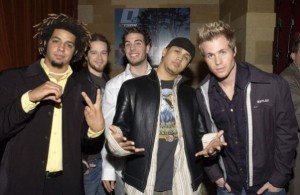Hit Charade
 Not every magazine article should get promoted to full-length book. Sometimes it works (Into Thin Air), but sometimes it doesn’t: Tyler Gray’s Hit Charade: Lou Pearlman, Boy Bands, and the Biggest Ponzi Scheme in U.S. History is disappointing.
Not every magazine article should get promoted to full-length book. Sometimes it works (Into Thin Air), but sometimes it doesn’t: Tyler Gray’s Hit Charade: Lou Pearlman, Boy Bands, and the Biggest Ponzi Scheme in U.S. History is disappointing.
In Gray’s defense, it’s probably hard to tell while writing it that the subject doesn’t merit a more extensive treatment (and next to impossible to call the publisher and say so), and I can’t say the topic didn’t catch my eye; I couldn’t wait to read the book.
But readers looking for more dirt on Pearlman’s alleged improprieties with the talent will get only rumors; most of the talent in question didn’t cooperate with the book, so Gray only has unsubstantiated whispering to work with. (Readers like myself who hoped O-Town would get mocked at length will also feel like Gray missed an opportunity. Is that season of Making the Band out on DVD yet? And if not, why not?) (Shut up, Jacob.)
Evidence of Pearlman’s financial double-dealing is in much greater supply (as well as witnesses willing to discuss it), but a Ponzi scheme is not in and of itself that difficult to understand, although its specifics may vary from scheme to scheme — what we usually want to know isn’t what, it’s how. How did investors fail to catch on? How did the schemer put it over?
Despite repeated references to Pearlman’s personal magnetism, Gray isn’t very good at nailing that down with specifics. Pearlman took a thread of legit business and wove an entire sweater of BS, and he did that from the very beginning, but the guy does not present as a smooth customer physically — how exactly did he get by with it? What exactly makes a registered nurse who is in love with someone else agree to beard for Pearlman for years? Why, although she’s accepted a marriage proposal from this someone else and Pearlman has already gone to jail, had the nurse not broken things off with Pearlman as of the book going to press? Gray tries to elicit answers, tries to guess at motives, but it doesn’t feel intuitive.
His research is thorough, but Gray feels kind of inexperienced. The notes on each chapter read oddly, for lack of a better word; he gives too much detail about each interaction, describes sources’ tones of voice and what phone they called him from…he claims the wealth of supporting detail here is to protect himself from various players pursuing various angles, but I doubt knowing that Johnny Wright called him on the car phone (or whatever) is pertinent to that. Gray worked for the Orlando Sentinel, I believe, so presumably he has a basic grounding in sourcing, and I don’t think I’d have noticed that weirdness in the end notes if Gray’s prose itself weren’t also rather stiff.
If you can track down the original article in Radar — or a similar article in VF — you’ll probably like those better. Hit Charade stretches its material a bit too thin.
Tags: books Famous Original Making the Band Johnny Wright Jon Krakauer Lou Pearlman O-Town shut up Jacob from O-Town true crime Tyler Gray






While I’ve never cared about boy bands especially I am fascinated with the whole “charisma” angle of con men, especially since charisma seems so subjective. It’s like watching two or three or four women-children catfighting over some lump on Jerry Springer, wailing and clawing like he’s the Archangel Gabriel, and you’re looking at this guy, who’s projecting all the radiance and allure of cold oatmeal mushed up with coffee grounds going “What the hell? The only thing they should be fighting over is who’s first out the door!” But the guy must have something, somewhere.
I’m guessing Ponzi schemes and the like benefit a lot less from personal charisma now, in the age of the internet and such, than they did back when Ponzi was selling his financial coupons. Ponzi took advantage of a population who really had no idea about investments at all. He needed to be a real Barnum ‘n Bailey type “step right up” showman to lure the crowds in. It was all about what he could generate.
But nowadays everybody has access to a much greater basic level of information, just floating around out there. These young guys didn’t have to be told what a band was or what they’d get out of being in a band, they already knew. Lou had to be less of a carnival barker and more of a Big Daddy Provider, taking care of all the grownup stuff while stroking their egos and giving them what they wanted (reassurances that they were so great and fabulous, girls, parties, whatever MTV told them they deserved for existing on earth). It apparently takes a lot less time and effort to generate that kind of cocoon than keeping fifteen plates spinning while riding a unicycle and playing a kazoo.